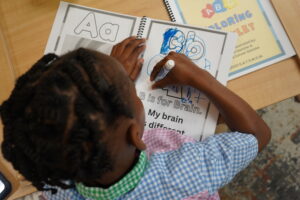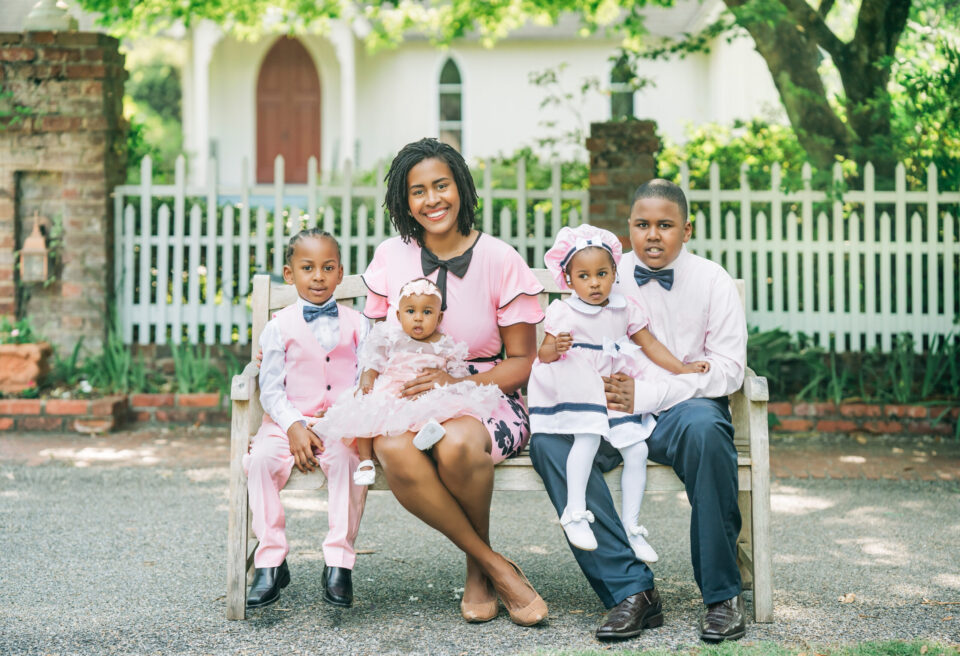Tametria Conner Dantzler is more than just a parent—she’s an advocate and Founder of Disability as an Ability Toward Success: Moms on the Move, also known as D.A.T.S.M.O.M. The nonprofit D.A.T.S.M.O.M. serves more than 500 families of children on the spectrum across the country through virtual and in-person services and programs. She’s also the mother of four children: Conner, 11; Anthem, 5; Liberty, 3; and Legacy, 16 months old. They’re an active family: You’ll likely find them playing outdoors, at one of their multiple weekly therapy appointments, or attending community events that help them progress. She and her five-year-old Anthem recently released Anthem’s Autism ABC Coloring Booklet, which teaches kids about autism in a hands-on, simplistic way. Discover what led Birmingham local Tametria to go down this road and learn from her tips for your own journey with a child with autism.
What inspired you to start Disability as an Ability Toward Success: Moms on the Move (D.A.T.S.M.O.M.)?
The diagnosis of my son Conner prompted me to act. The struggles and successes of navigating along this new journey and “figuring it out” led me to create D.A.T.S.M.O.M. I saw a need and created what I thought would address that need. With a focus on culturally relevant support, and breaking down educational and access barriers, this organization is here to help parents see themselves as experts who belong at the table where decisions are being made about their children’s outcome and service delivery plans. I will help you develop your knowledge base, research and leadership skills and create a plan.
Clearly, I’m passionate about my son, but I’m also passionate about serving others while being a voice for the voiceless. I started sharing my story to inspire others. I’m a motivational speaker and professional trainer. D.A.T.S.M.O.M. is a spin-off of my high-demand workshop session: “Disability as an Ability Toward Success: Understanding the diagnosis and journey, while executing the plan.” After standing-room-only sessions and positive feedback from thousands across the country, I wanted a way to teach the under-served and under-represented parents of children with autism who are in most need of advocacy, leadership and educational training, resources, and support.
I really am D.A.T.S.M.O.M. It’s not just an acronym or organization, but my lifestyle. I’ve always been a go-getter and it just trickled over into parenting once I had my first child Conner. I’m confident in my ability as a parent. I love parenting. I enjoy doing the work to help my children discover and hone their abilities and close the gaps on their deficits.

Can you share a bit about your personal journey as a mom and advocate for children on the autism spectrum?
Eleven years ago, I started my quest for discovering what was going on with my oldest son Conner. The roadblocks, lack of resources and programs in the state, personal trial and errors, and then creating my own paths to a plan that worked for me and creating what I didn’t see, is my personal journey as a mom. I wanted to share my experiences with other parents. I knew other parents who I did not know were going through the same struggle to find help with their child and figure out how to best navigate the autism journey. I wasn’t going to wait for others to help Conner. I figured out how to help Conner.
Had I waited, he would still be on waiting lists for private therapy and government-funded programs. For example, Conner was on a waiting list for four years for state mental health services. I received a letter stating he would be removed from the list because service providers were not available. Through self-education and traveling out of state for training and resources, I created my family’s autism journey toward progress and success. I now have two sons on the spectrum. Anthem is five and was diagnosed in September of 2023. He was also diagnosed with ADHD. Both are two very different children on the spectrum. I always tell parents if you’ve seen one child on the spectrum, you’ve seen one child on the spectrum.
What were some of the biggest challenges you faced early on, and how did they shape your mission?
Not finding the help I needed motivated me to be the help I needed. I hit the ground running, educating myself on best practices for all aspects of autism, be it services, access, training, and raising a child living with autism. It pushed me into a new purpose of sharing the knowledge and experiences I gained along my family’s autism journey, like going into a space and realizing my son doesn’t fit or isn’t welcome. The eye-opening experience of entities and service providers not addressing or prioritizing our needs prompted me to create the programs and services that were non-existent. I knew other families needed these programs and services as well. The connection and relatability factor really resonates with parents. I’m not telling them what I’ve heard. I’m telling them what I know from the experience of going through the same avenues they are about to go down or have also experienced.
What kind of impact have you seen in the lives of families who’ve been involved with D.A.T.S.M.O.M.?
The personal testimonies from families have truly been mind-blowing. Word of mouth has been my most valuable marketing tool. The personal touch, authenticity, time, and attention I give to parents is unmatched. Accessibility is a big issue for many autism families. We simply can’t reach people, organizations, or entities when we need help. Or when we reach them, it takes months or even years for action. Even with four children and their therapy and community-based schedules, I will respond to emails overnight and have conducted virtual Zoom trainings with parents on the weekends. I’ve been in their shoes and are still in their shoes in some instances, so I just show up as the person I would want and need.

What types of training or educational programs do you provide for parents or caregivers?
Our mission is simple: inspiring, motivating, and challenging families of children on the autism spectrum or with related developmental disabilities. The goal is to provide a platform to help parents shift their children’s disability into an ability by equipping you with the knowledge, resources, and tools necessary to become effective advocates. With a focus on training, culturally relevant support, and breaking down educational and access barriers, this organization is here to help parents where they are.
I write family programs for children on the autism spectrum and also provide training on various topics. Advocacy and leadership training are popular training topics parents take advantage of. The parent consultations and first-time diagnosis trainings have high participation as well. Since the pandemic, these services have been provided virtually. Parents enjoy connecting with me to find out my strategies, plan, and experiences with my own children, what has worked, what hasn’t worked; as well as resources they are unaware of. I also create partnerships with entities and organizations to render programs and bring new programs to the areas in which I serve families. Most recently, I’ve partnered with North Carolina State University to render its FACES Training Program (Fostering Advocacy, Communication, Empowerment, and Support). This will be the first time the training program will be rendered in the state of Alabama for African American families of children on the spectrum. D.A.T.S.M.O.M., through the Conner Dantzler Autism Scholarship Fund, provides annual scholarships to individuals on the spectrum.
What are your hopes and goals for the future of D.A.T.S.M.O.M.?
My goal is to continue to write programs and services for families of children on the autism spectrum. I want to increase capacity and build partnerships that result in the sustainability of D.A.T.S.M.O.M. programs and services. I will continue sharing what I know and have done with my own children with other parents and caregivers.
What advice would you give to parents who have just received an autism diagnosis for their child?
I would advise parents who have just received an autism diagnosis to ask themselves these three questions:
- Will I accept or reject this diagnosis?
When we are presented with either new knowledge or a confirmation of what we already suspected, we have the power to accept or reject it. We also have the power to take action or do nothing. The path we chose will determine our autism journey. Avoidance of facts and action will only delay your progress, both for you as an individual and the collaborative journey you will have with your child and their therapists and village. Get a therapist for yourself. We focus on therapy for our child, but fail to acknowledge and make time for us as parents to seek counseling, specifically to vent about this autism journey and how it has or will impact your mental state and overall life.
- How can I help myself understand what this means for me and my child?
As a parent, you are actually the person in the driver’s seat of this autism journey. If you don’t fully understand what you are facing and what’s ahead, you will get frustrated and that displaced anger and fear will be projected on your child. You don’t know what you don’t know and there’s no shame in that. Don’t be afraid to ask questions. Request help. Practice patience with yourself and your child. Be open to a new mindset, new ways of doing things, and lots of trial and error.
- Am I willing to do the work to adjust my life to meet my child’s needs and help my child best navigate this journey?
Life adjustments will need to be made. A strong work ethic and discipline are required, but don’t beat yourself up if you aren’t where you need to be right now. It will get overwhelming. Chip away at the iceberg one piece at a time. Creating a plan for your child and family that works for your capacity is a requirement and not an option. Educating yourself is a requirement and not an option. “First Time Autism Diagnosis: Where do I go from here,” is a free training topic and service D.A.T.S.M.O.M. provides to parents of children on the spectrum. Virtual training is available via Zoom so any parent across the country can access this free service. Email datsmom@datsmom.org to schedule your session.
How can people support D.A.T.S.M.O.M. or get involved in your mission?
Those interested in getting involved with our mission or who want to support D.A.T.S.M.O.M. families have several options. You can partner with D.A.T.S.M.O.M. to host free parent trainings in your area. We are always looking for venues, childcare volunteer staff, and new areas to facilitate in-person or virtual connections and an opportunity to share resources and information with families of children with autism. We’ve had organizations reach out to sponsor families, contacting families directly to ask their specific needs or provide a specified number of sensory items or toys to our group to give to our D.A.T.S.M.O.M. kids. If you would like to sponsor a family, have space to lend for a training, or would like to host a virtual training, please email datsmom@datsmom.org.
To learn more about D.A.T.S.M.O.M., visit their website.





